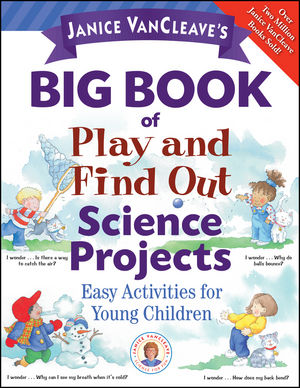Janice VanCleave's Big Book of Play and Find Out Science ProjectsISBN: 978-0-7879-8928-6
Paperback
224 pages
March 2007, Jossey-Bass
 This is a Print-on-Demand title. It will be printed specifically to fill your order. Please allow an additional 10-15 days delivery time. The book is not returnable.
|
||||||
Introduce young children to the wonders of science
Using this book as a guide, you and your favorite budding scientist can have fun exploring the world while you help your child learn about science and develop important science process skills. You may think it's hard to get young children interested in science, but just watch their eyes light up when they make bouncy blubber or play clay, or when you venture out together in the backyard or local park for a bug-collecting expedition. These are the kind of everyday explorations that give kids a great foundation for a lifetime of science learning.
In this terrific collection of fun, kid-tested science activities, bestselling children's science writer and former teacher Janice VanCleave has combined her favorite science activities for young people into one jumbo-sized book that you and your children will love.
Janice VanCleave's Big Book of Play and Find Out Science Projects includes over 50 easy-to-do activities and is divided into four parts:
PHYSICAL SCIENCE: Encourage kids to get physical with science with questions such as: How does a compass work? Why do I have to wear a seat belt? Why can't I catch a rainbow? Why does my hair stick to a comb?
NATURE: Help children answer questions naturally including: Why do cats' eyes glow in the dark? How do fish move up and down in the water? Why do plants move toward the sun? Can squirrels really fly?
BUGS: Challenge the science bug in kids with questions such as: Why do fireflies light up? How do butterflies drink? Where do spiders come from? Why are walkingsticks hard to find?
HUMAN BODY: Capture children's imaginations about the whole body of science with questions like these: Why do I have hair on my body? How does my heart sound? Why do foods taste different? Why are my bones hard?
Using this book as a guide, you and your favorite budding scientist can have fun exploring the world while you help your child learn about science and develop important science process skills. You may think it's hard to get young children interested in science, but just watch their eyes light up when they make bouncy blubber or play clay, or when you venture out together in the backyard or local park for a bug-collecting expedition. These are the kind of everyday explorations that give kids a great foundation for a lifetime of science learning.
In this terrific collection of fun, kid-tested science activities, bestselling children's science writer and former teacher Janice VanCleave has combined her favorite science activities for young people into one jumbo-sized book that you and your children will love.
Janice VanCleave's Big Book of Play and Find Out Science Projects includes over 50 easy-to-do activities and is divided into four parts:
PHYSICAL SCIENCE: Encourage kids to get physical with science with questions such as: How does a compass work? Why do I have to wear a seat belt? Why can't I catch a rainbow? Why does my hair stick to a comb?
NATURE: Help children answer questions naturally including: Why do cats' eyes glow in the dark? How do fish move up and down in the water? Why do plants move toward the sun? Can squirrels really fly?
BUGS: Challenge the science bug in kids with questions such as: Why do fireflies light up? How do butterflies drink? Where do spiders come from? Why are walkingsticks hard to find?
HUMAN BODY: Capture children's imaginations about the whole body of science with questions like these: Why do I have hair on my body? How does my heart sound? Why do foods taste different? Why are my bones hard?



